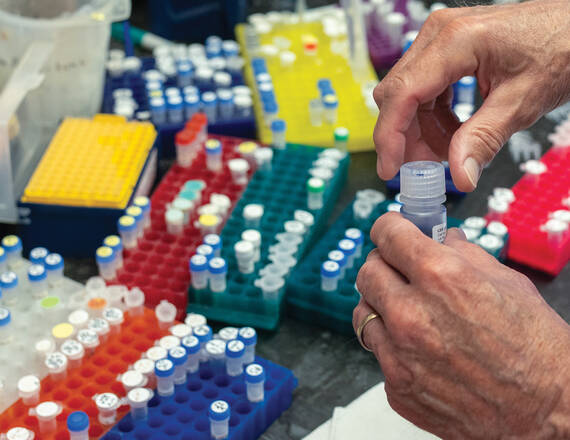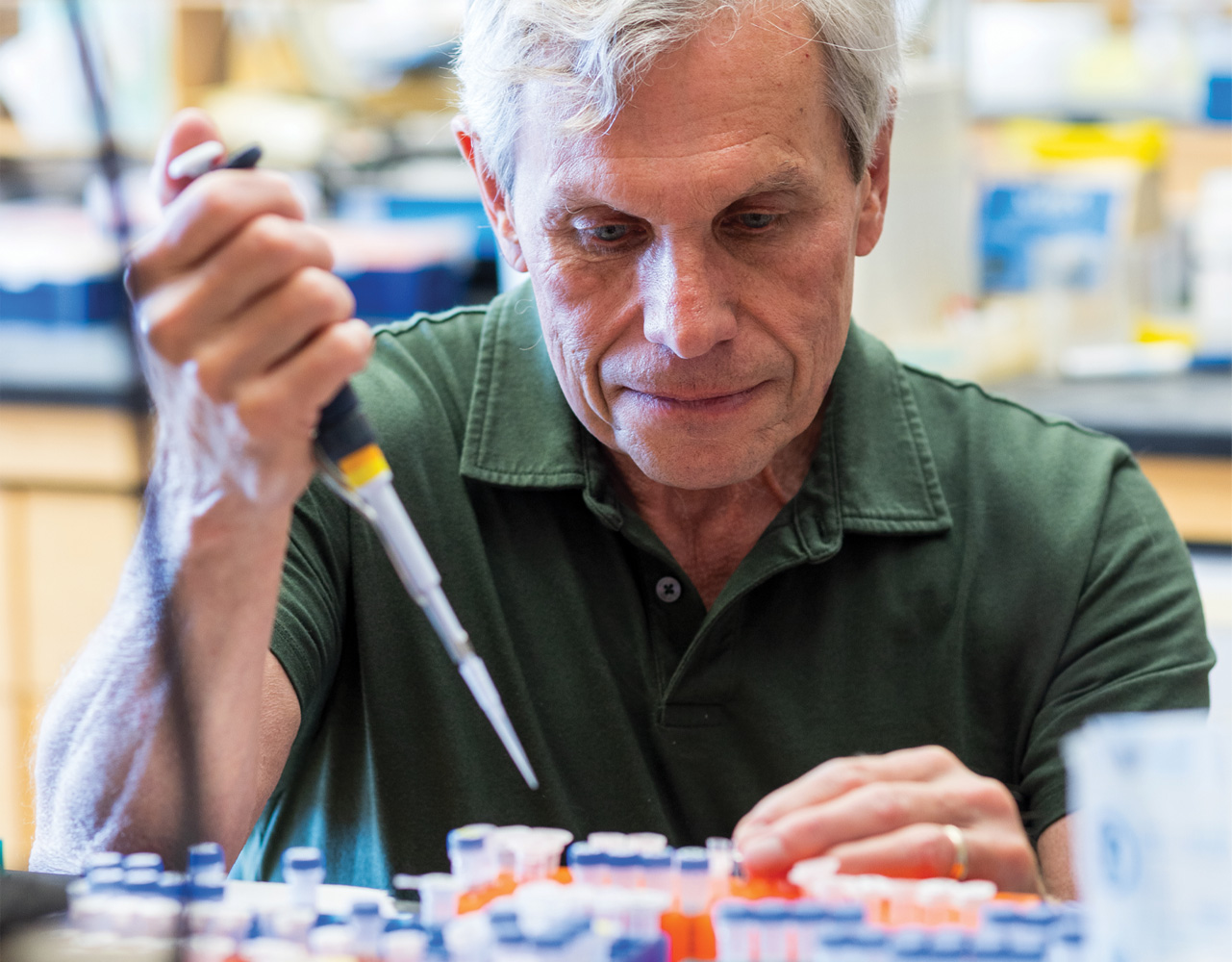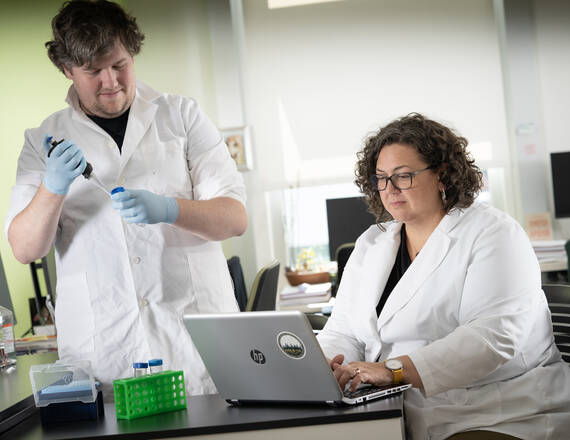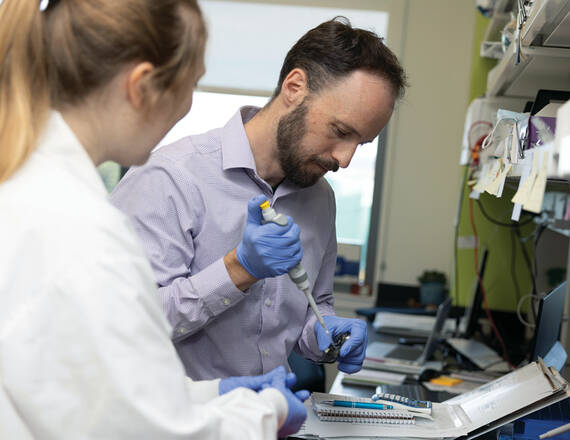Cancer's Most Wanted Target: The Undruggable MYC
For decades, cancer researchers have been stymied by an elusive challenge: a gene that fuels unchecked cell growth. Myelocytomatosis oncogene (known as MYC) plays a role in most deadly tumors. Yet efforts to develop drugs to rein it in have consistently fallen short.

Now, a pair of Dartmouth scientists may have finally cracked the “MYC problem” in cancer. Michael Cole, PhD, a professor in the department of molecular and systems biology at Geisel School of Medicine, and Ed Feris PhD, Guarini ’19, an experimental molecular medicine researcher in Cole’s lab, have devised an innovative new strategy to target this “undruggable” gene.
“This has been called the ‘most wanted’ targeted therapy,” says Feris. “Most large pharmaceutical companies in the world have an active MYC program. Here we have a gene that is overexpressed in 70% of all cancers. But how do you drug such an essential gene?”
The “Impossible” Problem
Cole first recognized something unusual with MYC (pronounced “mick”) in virtually every tumor he examined in the early 1980s. In DNA surveys, Cole noticed MYC was sometimes located at different chromosomal positions, which scientists call being “translocated.” Such rearrangement, he found, often accelerated MYC expression beyond healthy levels.
Cole’s groundbreaking discovery established MYC as a key oncogene—a gene that, when mutated or overexpressed, drives cancer. In healthy cells, MYC encodes a protein that sustains key biological processes such as regular cell growth and survival. When translocated and amplified, however, it causes those processes to run amok and contributes significantly to cancer development.
“In many cancer cells, the MYC gene gets duplicated and duplicated and duplicated. Suddenly, you have 10, even up to 100 copies of the MYC gene in a single cell which then makes too much protein. It’s like putting your foot on the accelerator and pushing it down to go 1,000 miles per hour,” Cole says.
But targeting translocated MYC has proven an “impossible” challenge, in Cole’s words. Part of the problem lies in how MYC binds tightly to DNA, making it inaccessible to traditional drug approaches. Another issue is that the protein MYC doesn’t have any small pockets—or binding sites—where drugs can easily attach and interact with it. This makes it challenging to develop drugs that can directly target the MYC protein. And because the gene is a key regulator of cell behavior, “You can’t get rid of MYC or else you’re dead,” Cole states bluntly. “Every cell in the human body needs MYC.”
To circumvent these problems, scientists have spent the last 20 years looking for ways to stop MYC from binding to DNA. Such efforts have thwarted “virtually everyone,” according to Feris.
Shining a Light on the “Impossible”
While others were busy trying to target MYC’s DNA-binding proclivity, Cole was looking elsewhere. A region of the MYC protein, named “MYC Box 2,” caught his eye. He noticed that MYC Box 2 normally interacted with another protein called TRRAP. Disrupting the MYC-TRRAP interaction, Cole believed, could be the key to discovering a drug for the “undruggable.” The question now was, how to find compounds that could do this?

To answer this question, Feris sought to identify small molecule inhibitors that target the space between MYC and TRRAP. With advanced robotics and a novel light-based assay, he assayed over 50,000 compounds. “Targeting the DNA binding domain of MYC is what most people have done. Our light-based technology makes it easier and faster to screen many different compounds to find the most promising ones that can disrupt the MYC-TRRAP interaction,” Feris says. “Nobody has ever attempted this approach.”
Right when the Dartmouth pair had developed this novel strategy for taking down cancer’s “most wanted” target, a new challenge quickly reared its head: Cole and Feris’ project required more resources than what a typical academic lab could provide. They needed to not only to find funding, but also navigate the process of bringing their scientific breakthroughs from the lab into the real world for patients in need of new cancer therapies.
Dartmouth’s Innovations Accelerator for Cancer to the Rescue
To keep their momentum, Cole and Feris joined Dartmouth’s Innovations Accelerator for Cancer (DIAC) program. DIAC was initiated by the Magnuson Center for Entrepreneurship at Dartmouth to provide pilot funding for innovative projects and to instruct in crucial entrepreneurial training in how to commercialize innovations and connect with potential investors. Cole and Feris won the first $100,000 DIAC award in 2021, which enabled them to expand their research, to found an early-stage biotechnology start-up called cosMYC, and to begin a search for investors.
After meeting with around 30 investors, the team completed a $6.2 million Series A funding round in October 2022 from a blue-chip biomedical investment group to support their MYC-targeting work. This also gave cosMYC the opportunity to manage the growing developments in their research and to expand their search to 500,000 compounds. The investment funding should allow them ample time to further their approach and test novel compounds to targeting MYC in cancer in an animal model.
In June 2024, cosMYC secured an Early Career Investigator Fast-Track Phase I/II STTR/SBIR $2.4 million award. “The grant will allow us to accelerate our timeline and expand the reach of our project. We are happy that this special NIH program exists and allows us access to nondilutive funding sources,” Feris says.
If successful, their work could lead to new therapies targeting the MYC protein—transforming what was once considered an “impossible problem” and “undruggable” cancer driver into an innovative solution, offering hope to millions of cancer patients.
To learn more about the Dartmouth Innovations Accelerator for Cancer, contact Erin Shreve at 603-646-5878 or Erin.Shreve@hitchcock.org.

